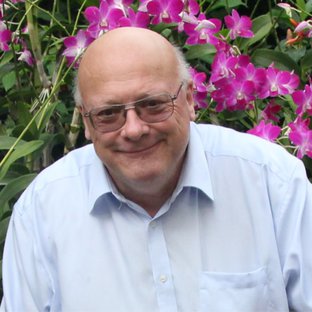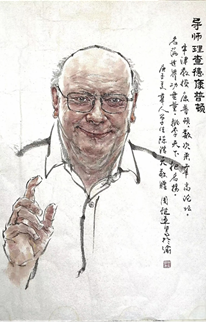
Professor Richard Compton FRSC MAE
Biography
I was educated at state schools in Felixstowe (Suffolk) and then in Frome (Somerset). I studied Chemistry as an undergraduate at University College, Oxford after which I worked for my DPhil in 1980 at Imperial College. Following post-doctoral work I subsequently held a Lectureship (in Physical Chemistry) at Liverpool University for four years before joining Oxford University where I have been Professor of Chemistry and Aldrichian Praelector, as well as Tutor in Chemistry at St John’s.
Teaching
At the undergraduate level I lectured on Electrochemistry and taught Mathematics (to second-year Chemists). I taught St John’s undergraduates at different stages of the first three years of the MChem course covering differing aspects of Physical Chemistry as well as supervising Part 2 students from across the University. The College-based teaching is done in groups and seeks to develop a rigorous, bottom-up and holistic appreciation of Physical Chemistry and as such synergising Chemistry with advanced Mathematics and elementary Physics.
The graduate textbook Understanding Voltammetry (with C. E. Banks) was published in 2007 (1st edition), 2011 (2nd edition) and 2018 (3rd edition) by Imperial College Press/World Scientific Publishing and listed as a ‘bestseller’. The Russian translation was published in 2015 and the Chinese in late 2021. Two companion volumes have been written: ‘Problems and Solutions’ (with C. Batchelor-McAuley and E. J. F. Dickinson) was published in 2012 and ‘Understanding Voltammetry: The Simulation of Electrode Processes’ 1st edition with (E Laborda and K Ward) in 2013 and 2nd edition (additionally with E. Kätelhön) in 2020.
Research Interests
Fundamental Electrochemistry, Chemical Sensors, Electro-analysis

Understanding electrochemical processes is the key to developing energy storage and conversion devices (fuel cells, solar cells, batteries) as well as being at the heart of much of modern biology and nanotechnology. At the same time electrochemical sensors provide sensitive, selective, clean and easy to use approaches to the detection and monitoring of many important chemical species (gas sensors, blood sugar, pH).
The Compton Research Group has broad and deep interests ranging from fundamental electrochemistry (theory of electron transfer and of mass transport phenomena; theory of porous electrodes; explanation of nano-toxicity) to making chemical sensors where we have invented, patented and licensed calibration free pH sensing, food sensors for the heat of chilli peppers and for the strength of garlic, electrochemical detectors for bacteria, sensors for hydrogen sulfide under the high temperature and pressure conditions at the bottom of oil wells and for biomarkers in saliva.
The current major funding for the group is via a large collaborative, high-risk programme within the Oxford Martin School entitled ‘Monitoring Ocean Ecosystem’ with Profs Ros Rickaby and Heather Bouman (both Earth Sciences, Oxford) which aims to develop and undertake preliminary field-testing on prototypes for low cost sensor technology to continuously count and monitor oceanic phytoplankton and the calcium carbonate shells that they produce as part of their lifecycle. The sensor technology could be transformative in our understanding of the future global ocean carbon cycle and ecosystem status. Establishing a baseline of phytoplankton productivity and diversity could provide vital information for identifying environmental pressures, as well as providing an early warning system on developments like algal blooms which can be harmful to fisheries and conservation efforts.
Other research is focused on the development of bespoke pH and other sensors especially for medical (fetal blood) and environmental applications as well as on fundamental electrochemistry, especially modelling and theory.
A key feature of the Compton group has been and remains its internationality and its diversity. At least a dozen former group members hold permanent academic posts from lecturer to professor in the UK whilst others have equivalent positions in Australia, Brazil, China, Colombia, France, Germany, Indonesia, Japan, Serbia, Singapore, Sri Lanka, Spain, Taiwan, Ukraine and USA.
(Painting of Richard Compton by Chongqing artist Zhou Jilian )
What inspired me?
I chose chemistry as a career because I was able to continue and combine, in different ways, my interests in chemistry, mathematics and geology, all of which attracted me as possible subjects. Thus my research group solves partial differential equations to describe electrochemical phenomena whilst the chemistry of calcium carbonate as the protective shells (coccoliths) of some marine plankton is a current focus of our work.
Selected publications
Miao R. and Compton R. G., ‘The Electro-oxidation of Hydrazine: A Self-Inhibiting Reaction’, J.Phys.Chem.Letters, 12, 1601 (2021)
Guo Y., Yang M., Xue R-C. and Compton R. G., ‘The Oxygen Reduction Reaction at Silver Electrodes in High Chloride Media and the Implications for Silver Nanoparticle Toxicity’, Chemical Science, 12, 397 (2021)
Yang M., Batchelor-McAuley C., Chen L., Guo Y., Zhang Q., Rickaby R., Bouman H. and Compton R. G., ‘Fluoro-electrochemical Microscopy Reveals Group Specific Differential Susceptibility of Phytoplankton Towards Oxidative Damage’, Chemical Science, 10, 7988 (2019)
Couto R. A. S., Chen L., Kuss S. and Compton R. G., ‘Detection of Escherichia Coli Bacteria by Impact Electrochemistry’, Analyst, 143, 4840 (2018)
Lin C., Sepunaru L., Kätelhön E. and Compton R. G., ‘Electrochemistry of Single Enzymes: Fluctuations of Catalase Activities’, J Phys.Chem.Letters, 9, 2814 (2018)
In total I have published >1600 papers with an h-index of 107 with >50,000 citations (excluding self-cites) – Web of Science, August 2021.
I was the Physical Chemistry Editor of the Oxford Chemistry Primers (Oxford University Press): A series of 99 short textbooks for undergraduates. I am the co-author of the primers Foundations of Physical Chemistry (with C. Lawrence and A. Rodger, translated into Japanese and Spanish), Electrode potentials (with G. Sanders), and Foundations of Physical Chemistry: Worked examples (with N. S. Lawrence and J. D. Wadhawan who at the time of writing were undergraduate students at St John’s).
I am the Founding Editor and Editor-in-Chief of the journal Electrochemistry Communications (current impact factor >4.5) from 1999 and the Co-Founding Editor and Co-Editor-in-Chief of the journal Current Opinion in Electrochemistry, launched in 2017.
See also https://onlinelibrary.wiley.com/doi/epdf/10.1002/anie.201505530.
Partnerships
Patents have been filed on c. 30 different topics including electrochemical cannabis and amphetamine detection (basis of the spin-out OxTox), novel pH sensors (leading to the spin-out Senova, also licenses to ANB Sensors and Parker), gas sensing and the detection of garlic strength and chilli heat in foodstuffs (licensed to Zimmer and Peacock). Most recently patents have concerned electrochemical detection of bacteria (licensed to Zimmer and Peacock) and of plankton.
Awards and distinctions
I hold Honorary Doctorates from the Estonian University of Life Sciences and Kharkov National University of Radio-electronics (Ukraine), am a Fellow of the Royal Society of Chemistry, of IUPAC and of the International Society of Electrochemistry and a Member of the Academy of Europe (MEA).
Recent awards include the following:
- 2021 Elected Foreign Member of the Lithuanian Academy of Sciences
- 2020 Theodor von Grotthuss Medal for achievements in science. (The Grotthuss medal was established and is managed by an International Board of the Theodor von Grotthuss Foundation.)
- 2019–24 Visiting Professor, Central South University, Changsha, China
- 2018 Robert Boyle Prize in Analytical Science (Royal Society of Chemistry
- 2017 Visiting Professor, Ecole Normale Superiore, Paris
- 2015 Thomson Reuters ‘World’s Most Influential Scientific Minds’
- 2015–24 Honorary Professor, Xiangtan University, Hunan, China
- 2014 Fellow of the International Union of Pure and Applied Chemistry
- 2014–19 Thomson Reuters Highly Cited Researcher
- 2014 Khwarizmi Award (Iran)
- 2014 Noblesse Lecture, Institute of Physical Chemistry, Polish Academy of Sciences, Warsaw
- 2013 Oxford University MPLS Divisional Impact Award – ‘A lifetime award for successfully engaging externally and promoting impact’
- 2013 Professeur Invité, University of Rennes, Bretagne, France
- 2011–16 Chinese Academy of Sciences (CAS) Visiting Professor, Institute of Physical Sciences, Hefei, China
- 2011 Sir George Stokes Award of the RSC for ‘work in translating original and fundamental insights in interfacial charge transfer mechanisms and their kinetics into innovative and robust analytical sensing protocols (which has) revolutionised the field of electroanalysis’.
- 2010 Elected Fellow of the International Society of Electrochemistry
Media
Interview on Macedonian breakfast time TV (September 2018)
Interview about Electrochemistry for the Serbian Broadcasting Corporation (SBC), December 2017